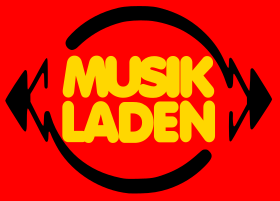Music store
| Television series | |
|---|---|
| Original title | Music store |
| Country of production | Federal Republic of Germany |
| Year (s) | 1972-1984 |
| Production company |
Radio Bremen |
| Episodes | 90 (+59 follow Musikladen extra ) ( list ) |
| genre | Music show |
| Moderation |
|
| First broadcast | December 13, 1972 on German television |
The music store was a music show produced by Radio Bremen and ran from December 13, 1972 to November 29, 1984 in a total of 90 episodes on German television . The programs were all produced and broadcast live under the direction of Michael 'Mike' Leckebusch in one of Radio Bremen's television studios (Studio 3) on Hans-Bredow-Straße (Bremen-Osterholz). Only a few artist specials, which were also broadcast as “music stores”, were pre-produced. These were:
- Episode 27: ABBA Special
- Episode 40: The Amanda Lear Special
- Episode 73: Don Williams Special
- Episode 74: Shakin 'Stevens Special
- Episode 81: Best of
In addition, there were 59 episodes of Musikladen extra from May 1, 1974 to November 29, 1979.
A picture of the former studio building was held by Mike Leckebusch in the credits of some programs and then shown in large format, for example in episodes 17 and 18.
The music store succeeded the Beat Club and it was followed by the extra tour on ARD and Musikladen Eurotops on N3 , the 3rd program on Radio Bremen and NDR . The music stores Eurotops were produced by Radio Bremen under the direction of Michael Leckebusch in its own studio in Garlstedt . The studio was completely renovated in 2016 by its current owner and brought up to date with the latest technology. In addition to the original facilities from the 1970s that can be viewed, it has been home to a complete recording studio since 2017, in which the Cross Art Records label now produces.
To the broadcast
The program mainly consisted of live performances by the invited interpreters , with each interpreter typically performing a song. Typically the show was 45 minutes long, however some shows were longer and few were shorter.
Until about 1975 there were humor contributions such as cartoons by H. Hoier and appearances by the Insterburgs (later Schobert + Black ).
From Musikladen 33 (May 21, 1977), the famous Musikladen intro with the melody from A Touch of Velvet, a Sting of Brass (1965) by Mood Mosaic was shown at the beginning of the program . Gogo dancers could be seen to the melody and the names of the performing artists were faded in. The melody was also played again at the end of the music store. From 1979 onwards, the go-go girls were increasingly shown both in live performances by the artists and in specially produced video clips .
In each episode, after the first appearance, excerpts from four oldies from Beat Club or older music store programs were shown, one of which could be selected by telephone. The title that won the most votes was shown before the final appearance.
In addition to the Musikladen logo, the Musikladen Gogo Girls were the most famous element of the show, which contributed to the high recognition value . The go-go girls were mostly used to support artists and contributed to the show's cult status. Recordings of the Musikladen Gogo Girls were also shown in the follow-up video clip program Musikladen Eurotops .
The video effects were created using blue screen technology and visual feedback (a camera in front of a monitor that recorded its own image). The lighting effects came from the Stiers Effects company in Munich. At the time, these effects and picture-in-picture transitions were revolutionary for German television.
Stars and guests of the show
Many stars from the 1970s and early 1980s performed in the music store, such as Boney M. , The Police , Rod Stewart , Roxy Music , Shakin 'Stevens and ABBA , who among others. a. featured many of their early hits from Waterloo to Dancing Queen in a music store special .
But also artists from so-called alternative music scenes , such as the New York Dolls as one of the mother bands of punk rock , appeared in the music store. It was also the first music show on German television in which a for the time extreme metal band like Motörhead could appear in the fall of 1980 with the song Ace of Spades .
Videos
From Musikladen 53 in May 1980, individual music videos were occasionally shown that were still something extraordinary at the time. The video clip for the title Fade to Gray by Visage , which was shown in February 1981, meant that the group Visage (with Steve Strange , Midge Ure, among others), previously unknown in Germany , reached number 1 in the charts with this single and the LP Visage .
The broadcasts in detail
Web links
- Title, broadcast dates, etc. ( Memento from December 5, 2010 in the Internet Archive )
- TV nostalgia: music store
- Example of an appearance by the singer Aneka with optical effects characteristic of the series and an appearance by the GoGo girls .
